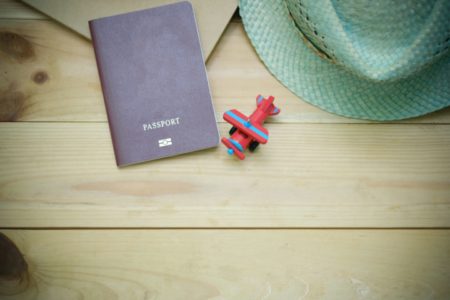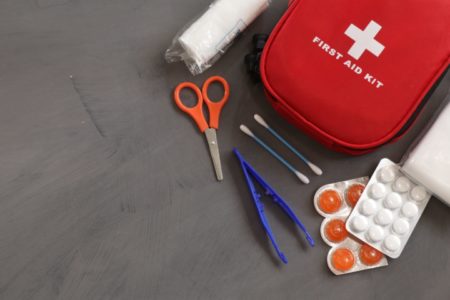My first time traveling abroad, I had no clue what to expect. I didn’t even get a passport until the day before my flight, but I was determined to do everything I could to go explore internationally. Now that I have made it back home, I realize there were a few things I wish I would’ve known before my trip that could’ve made my experience a lot less stressful.
If you will soon be experiencing your first time traveling abroad, there are a few things you should keep in mind to make your travel experience fun, carefree, and safe. Follow these tips as you prepare to travel internationally.
1. Give yourself enough time to get your passport

Porapak Apichodilok.
If you’re traveling internationally, having a passport is the first and most important step when you’re preparing for your trip. You can’t travel outside of the US without it, however, the process of securing a passport can be long and time-consuming. So give yourself enough time to get one before your vacation.
The standard processing time to receive a US passport by mail is 8 to 11 weeks. However, if you don’t have that much time, you can pay an extra $60 to expedite it and receive your passport in 5 to 7 weeks. Remember, the processing starts when the agency receives your completed application, not when you mail off your application or apply online. It’s important you have a large enough window of time to wait for your passport to come in the mail. It can be risky booking an international trip without a passport because you really don’t know the exact date it will arrive.
If it’s down to the wire and your trip is less than 7 weeks away, there is another route you can take to secure a passport. Each day, a certain number of same-day passports are issued at passport agencies around the country. Although getting a same-day passport can be stressful, it is totally worth the hassle if it ensures you’ll be able to get on the plane to travel abroad. When I traveled to Belize, I drove overnight to Chicago to get a same-day passport and my flight was the next day. So remember, all hope isn’t lost if you have an international trip planned and no passport in hand.
2. Secure travel insurance

Before I took my first international trip to Belize, I already knew I was going to secure some travel insurance. Travel insurance is designed to protect you against risks and financial losses that could occur while you are traveling. Although you can get insurance for domestic trips, it is especially important when you’re traveling internationally.
I decided to get travel insurance on my flight due to the fact that I initially didn’t have a passport when I booked my ticket. However, like many other countries, Belize required additional travel insurance before entering the country. The 21-day coverage was $18 and provided financial protection and “peace of mind” while traveling in the country.
There are many countries that required travel insurance to cross their border, including the UAE, Thailand, and St. Martin. Even though they didn’t ask us to present proof of insurance when we arrived in Belize, there’s really no telling when they could’ve decided to enforce the rule. So don’t try to bypass the country-specific travel insurance, and be sure to check if the place you’re visiting is on the list.
3. Notify your bank and phone company

Prior to traveling internationally, I called my bank to notify them that I would be heading to Belize later that week. The last thing I wanted was for my card to be shut down for fraud while in a foreign country. What I didn’t realize was that I also needed to let them know the cities I had layovers in, since I’d planned on eating in the airports.
I was very surprised when my card was declined when I tried to get cash out of the ATM in the Houston airport while waiting for my next flight. Thankfully, I was traveling on a weekday and I was able to call the credit union to notify them of the other destinations I would be stopping at. But waiting on hold for customer service while trying to make my way through the airport was frustrating, so make sure you call your financial institution in advance and let them know where you plan on swiping your card.
Also, as mentioned before, my card was being declined at an ATM because I needed to get cash before getting on the plane to Belize. When traveling internationally, always bring some cash with you. You never know when you may be in an area that doesn’t have an ATM or doesn’t accept cash.
4. You may not need to exchange your currency

Pixabay.
Before traveling internationally, I truly believed that I would need to change my US dollars to the local currency in Belize. I spent a nice chunk of time researching online how to change my money into Belize dollars, and after finding no clear answer online, I made a Facebook status about it.
To my surprise, most people suggested not changing the money over to Belize dollars. Turns out US dollars are accepted in Belize and many places prefer them because the US dollar is worth more than the Belize dollar. However, you are likely to save more money overall by paying in a currency worth less than your home country’s currency.
5. Find out what language is spoken in your destination country

Although I didn’t have time, I’d told myself I would brush up on my Spanish before heading to Belize. But the primary language spoken in Belize is English. If you’re certain the country you’re visiting doesn’t have English as its main language, you should definitely download a translation app and teach yourself some basic phrases before heading abroad. However, do your research beforehand because it may be an English-speaking country.
6. If you’re visiting a tropical destination, bring bug repellent

If you’re not traveling to a tropical location, this bullet point doesn’t apply to you. But if you are, listen very closely.
Bring insect repellent!
Apparently, people of certain blood types and people who produce more CO2 when they breathe attract more biting insects than others. When I returned home from Belize, I literally looked like I had chicken pox. There were bite marks everywhere, from my feet to my chest. Apparently, not only was I bitten by mosquitos, but I was also bitten by sand flies and spent my first few days back home taking oatmeal baths and rubbing down in calamine lotion. My boyfriend, on the other hand, didn’t get bitten at all.
I don’t know how to gauge how much CO2 you produce or how to know if you have what the old folks call “sweet blood”, but I highly recommend bringing insect repellant with you just in case the bugs decide to bite. There are a ton of brands you can try and some even say Skin So Soft bug spray also does a good job at keeping the bugs away.
7. Be aware of your surroundings

My momma always used to tell me to be aware of my surroundings wherever I go, and this rule thumb still applies when traveling internationally. It’s important to stay safe when visiting new places, especially in foreign countries where there are different rules and protocols. Not only does this include not wandering off into areas that could be dangerous, but you should also always be respectful of the culture and customs in international countries.
8. Pack a first aid kit & medicine

While I was visiting Belize, there were a few moments when I wish I had packed a first aid kit in my suitcase. I cut my hand open while spelunking on my first day in Belize and, right before we left, my boyfriend caught a stomach bug. Both times called for over-the-counter medicine, but we didn’t bring anything with us, so we had to rely on whatever the resort had available.
You honestly never know what will happen when you are traveling, so bring some health essentials and medications with you in case of emergencies. Some things I would recommend packing include pain relievers like ibuprofen or aspirin, Pepto Bismal, alcohol pads, Band-Aids, and antacids. A lot of essentials can be found in a first aid kit so, if you have room in your suitcase, bring it along.
Also, remember to bring any prescription medication you take on a regular basis and refill your prescriptions before you go abroad.
9. When departing, arrive early to go through customs

When you’re leaving your destination to head back home, you will have to through customs. Actually, you’ll go through customs a few times, once when you’re exiting and again when you’re re-entering your home country. There’s no telling how many people will be waiting to go through customs at the same time as you, so give yourself ample time to get through customs before your boarding time. Some foreign countries also don’t allow electronic flight check-in, so waiting in line to get your boarding pass will also delay you getting to your gate.
10. You may need to re-check your bags when you arrive back in the States
Once I boarded the plane to head back home, I was caught off guard when the flight attendant announced we’d need to get our checked bags in Atlanta before we boarded the transfer flight to our final destination. It really didn’t make sense why we had to uncheck the bag and check them again, but I followed instructions and grabbed my bags from the conveyor belt to put them back on the plane.
I had no clue where to go once I retrieved the bags, so I just followed the crowd. Eventually, it led me to another row of conveyor belts, and once the airport staff checked my passport, they loaded my bag on the belt. I’m not sure if this happens at every airport, but be on the lookout if it does. Usually, the flight attendant will make an announcement on-board before landing to retrieve your bags before boarding your transfer flight home.





